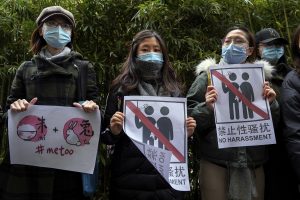China’s Lawmakers Take More (Cautious) Steps Against Workplace Sexual Harassment
Draft revisions to China’s women’s rights law are a step in the right direction, but are likely to have limited impact.
Supporters of Zhou Xiaoxuan hold banners as they wait for Zhou outside at a courthouse where she is appearing in a sexual harassment case in Beijing, Wednesday, Dec. 2, 2020.
Credit: AP Photo/Andy WongLast month, China’s National People’s Congress (NPC) reviewed major revisions to the Law on the Protection of Women’s Rights and Interests (LPWRI), first passed in 1992 and last overhauled in 2005. The state-run People’s Court Daily hailed the new draft as “strengthening the law’s operability” and addressing “hot button social problems.”
Among such issues, workplace sexual harassment has been the subject of particularly intense public discussion. In 2021, a spate of high-profile cases once again highlighted the extent of the problem and how survivors who come forward are more likely to receive retaliation than remedies. Research indicates that most women have been harassed at work, few employers have policies for addressing harassment, and survivors face steep challenges in court.
The proposed LPRWI revisions aim to strengthen the existing law by clarifying what constitutes sexual harassment, obliging employers to adopt concrete anti-harassment policies, and giving regulators new enforcement tools. But, as the drafter explained, the revisions avoided changing “matters that are relatively controversial or for which the timing or conditions are not yet ripe.” As such, the draft revisions are cautiously incremental, and are likely to have limited impact if finalized as is.
The Development of Sexual Harassment Law in China
Get briefed on the story of the week, and developing stories to watch across the Asia-Pacific.
The LPWRI draft revisions should be read in the context of the gradualist evolution of sexual harassment law in China. The original 1992 LPWRI did not contain the term “sexual harassment,” but did address issues like illegal police searches of women’s bodies. Two years later, Hubei province took a pioneering step by passing implementing regulations for the LPWRI that prohibited “sexual harassment against women.” For over a decade, it was the sole legal provision in China that mentioned “sexual harassment.”
When the LPWRI was amended in 2005, it adopted a prohibition on sexual harassment and added that survivors had a right to sue harassers and could submit complaints about sexual harassment to employers and government organs. The right to sue was not necessarily new: The first “sexual harassment” lawsuit – as it was popularly known at the time – had already gone to trial in 2001. Officially, it was an “infringement of bodily rights” case, since there was not yet a cause of action for “sexual harassment.”
In 2006, provinces began issuing implementing regulations for the amended LPWRI, and, like Hubei did previously, went beyond the national law. Numerous provinces required employers to take “measures” for preventing and responding to sexual harassment, enumerated examples of different forms of sexual harassment, and stated that government organs should investigate complaints. In 2012, a State Council regulation became the first national-level provision to put a general duty on employers to “prevent and curb sexual harassment against female workers,” though it did not elaborate on what that duty entailed.
National-level reforms picked up pace in 2018, arguably in response to the #MeToo moment. The Supreme People’s Court created a cause of action for sexual harassment, so survivors no longer had to file their cases under other categories. In 2020, the landmark Civil Code broke ground at the national level by obliging employers to adopt “reasonable measures” to address sexual harassment, such as procedures for receiving complaints and conducting investigations. Like many earlier provincial regulations, it also clarified that sexual harassment was not limited to physical contact but could occur through speech, writing, and images. Unique among China’s anti-harassment laws and regulations, it used gender-neutral language.
What’s New in the LPWRI’s Draft Revisions?
While anti-harassment law has grown on paper over the years, its real-world effects have been hard to see. Few employers fulfill their duties, and survivors rarely go to court, let alone win. The draft LPWRI revisions try to address these longstanding issues by clarifying duties and putting new enforcement tools into the hands of regulators – though, notably, not into the hands of individual women.
Clarification of Duties
Compared with earlier laws, the draft revisions provide more detailed illustrations of sexual harassment. Instead of just generally referring to “speech” and “images,” the draft includes “verbal expressions that have sexual meanings or sexual connotations” and transmitting audiovisual content that has “clear sexual connotations.” While these are just examples, they could guide courts and regulators in judging what constitutes sexual harassment. The presence or absence of modifiers like “clear” could create different thresholds for different kinds of acts.
The bigger development is the clarification of what employers must do to prevent and curb sexual harassment. The draft lays out an impressively comprehensive list, including adopting a written anti-sexual-harassment policy, conducting trainings for employees, designating responsible personnel, setting up hotlines and inboxes for complaints, and establishing procedures for investigations (the results of which should be provided in writing) and disciplinary actions.
Not-so-new Enforcement Tools for Women
The draft revisions do not significantly improve the enforcement tools available to women. Like the 2005 LPWRI, the draft says women can bring civil lawsuits against harassers and report sexual harassment to employers and government organs. In a new provision, it calls for the setting up of a nationwide hotline for women to report rights violations. Importantly, the draft does not provide that survivors can sue employers who failed to adopt or implement anti-harassment policies. Nor does it address the judicial procedures and practices that make it extremely difficult for survivors to prevail in court.

No comments:
Post a Comment